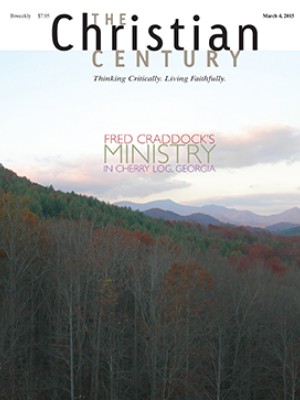Embargoed pensions

I visited Cuba 19 years ago, long before the recent softening of relationships between the Cuban and American governments. As a representative of the Presbyterian Church (U.S.A.), I was visiting the Independent Presbyterian Reformed Church of Cuba, which was established by Protestant missionaries in the late 19th century. The IPR churches had thrived over the years and had built a theological seminary at Matanzas.
After Cuba became a communist state the churches learned how to exist under the Castro regime’s strictures and subtle—and sometimes not so subtle—persecution. There were some arrests and imprisonments. Churches were mostly allowed to remain open, but evangelism efforts were forbidden, and it was almost impossible to print and distribute literature. Government agents often came to worship services; a Christian’s public affirmation of faith could have economical, professional, and educational consequences.
Read our latest issue or browse back issues.
At the time of our visit a warming of the relationship between the two nations had come to a sudden end, and there was a reemergence of suspicion, hostility, and fear. Despite these demanding and sometimes dangerous circumstances, Cuban Christians had remained faithful to their Christian commitments and their churches.
Then I made a distressing discovery. The Cuban Presbyterian Church was formerly an organic part of PCUSA, and Cuban pastors had paid into the Presbyterian Pension and Benefits Plan—but they weren’t receiving the benefits. After the Castro revolution, the assets of American corporations that were doing business in Cuba were expropriated, and our government placed an economic embargo on Cuba. Suddenly 50 retired Cuban pastors and church workers were deprived of their pension benefits.
For many years the Presbyterian Board of Pensions worked to persuade our government to allow the board to make payments. The legal issue was acquiring licenses that are required to make monetary payments to Cuban nationals or to release money from accounts held in the United States in their names.
Meanwhile the money sat in U.S. accounts where it increased in value to nearly a million dollars. But that money was not getting into the hands of the people who had earned it.
Presbyterian Pension Board officials would not give up. Frank Maloney, chief operating officer of the Board of Pensions, went to work with legal counsel Jean Hemphill. They continued to request the release of the funds and were denied each time by the Office of Foreign Assets Control of the U.S. Treasury Department. PCUSA Board officials and officers visited U.S. lawmakers—only to encounter the strong anti-Castro lobby in Congress that opposes any political or economic accommodation with the Castro government or the Cuban people.
Progress came in the mid-1990s when a license was issued to pay the Cuban retirees $100 per month, but it was still held up by the prohibition against U.S. banks doing business in Cuba. In the meantime, retired Cuban pastors were aging and starting to die. In 2006 the government licensed the church to pay up to $500 per month and permitted board staff to travel to Cuba to find the pensioners and their survivors.
Now, in the new atmosphere in U.S.-Cuban relations initiated by the Obama administration, the blocked accounts will be opened and full payment made to surviving Cuban pastors and their heirs.
The mainline denominational agency’s faithfulness and relentless commitment to justice reinforces my conviction that these structures do absolutely critical work and faithful mission.
Meanwhile, the Cuban church has pointed the way to faithful work with its courageous and durable witness. During visits nearly two decades ago and again in 2001, I developed ongoing friendships with Cuban pastors and church leaders. My experiences in worship, preaching, and baptizing a Cuban infant were inspiring.
The Christians in Cuba have carried on. They are still there. There is, I think, something in Jesus’ promise to Peter that the gates of hell will not prevail against the church.






